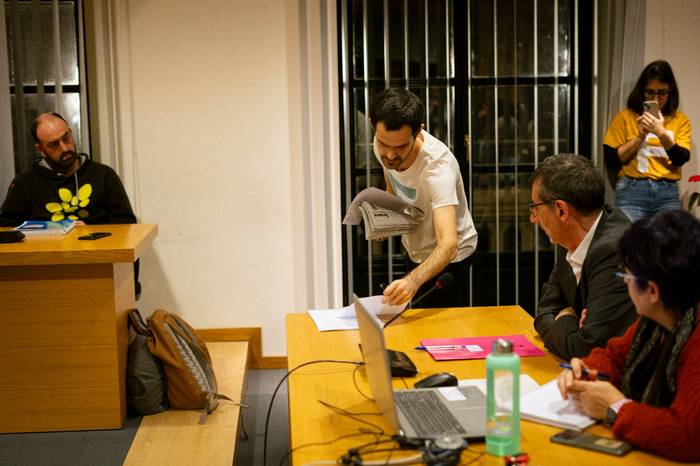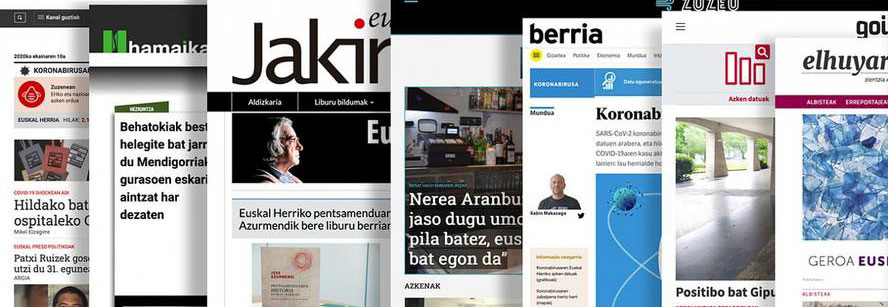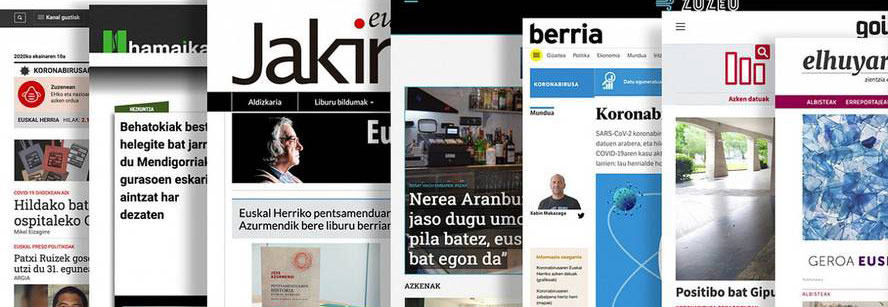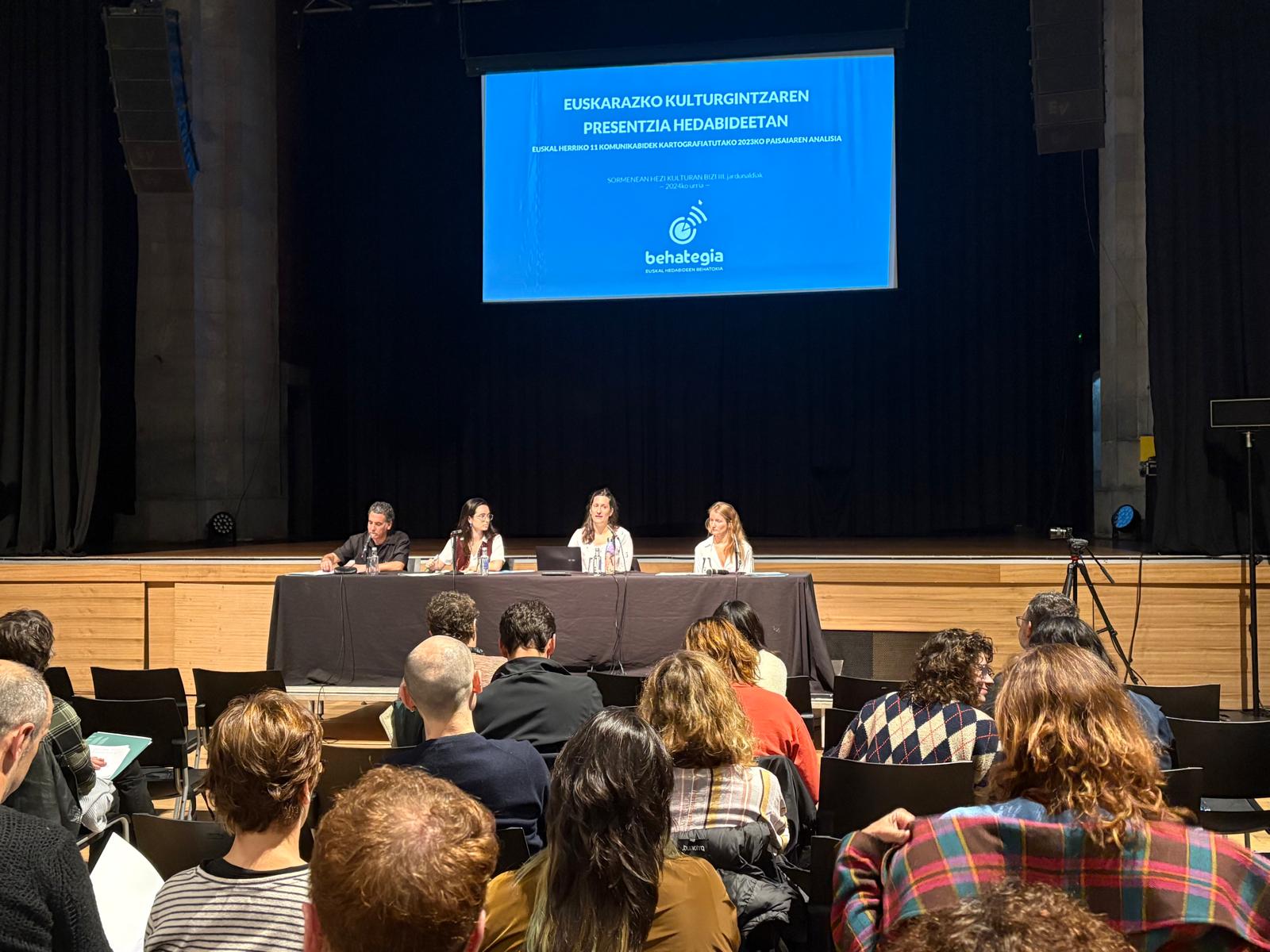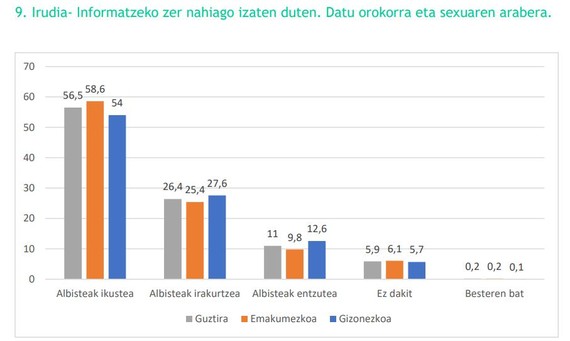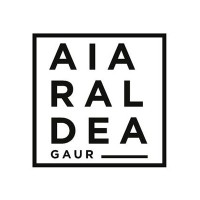"We have to think about how to reach the people who live here and don't see us."
- “The oak goes up the mountain, the goats go through the rocks…”.
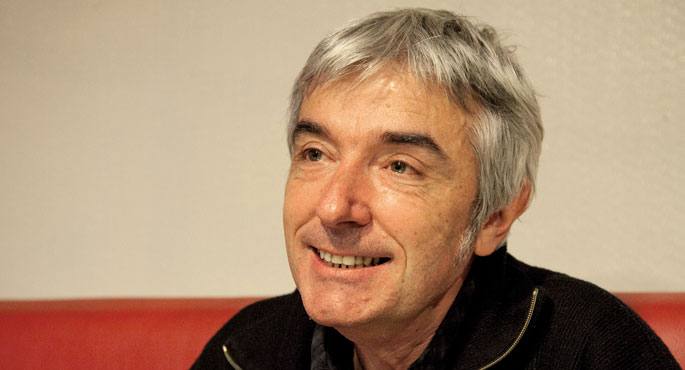
If the waters of journalism do not go further and further...
The new supports and tools have transformed our profession. We were like the teachers of the first school, the news observers. Our job was to put on the table what we knew thanks to the press conferences and research, to ensure the intermediation between the news and society. Now, the sources have multiplied, they're more accessible to everyone, and even though that sounds very healthy to me, it leads us to constantly rethink the essence of our work. As in our case, being the only quotation a day, our responsibility is to properly choose and pass through the sieve, to make people reach the keys we have at hand with the most sincerity possible. The American filmmaker Arthur McCaig made me realize that it was possible to work honestly, not objectively. Every day we rise with different states of mind, each one of us has our past, we live with our culture and our feelings... The initial objectivity is condemned. This doesn't mean that we don't have to try to understand the world honestly. People are very adult, not ignorant. I haven't yet found a 50-year-old woman who looks again and again silly in journalism schools in France. I am convinced that these wives are plural, admirable and respectful. Our job is to better understand our world, without belittling anybody or anything.
In these times when we get news from the world before what happens at home, what is the point of being a local journalist?
Local journalism is my daily bread. I am convinced that I have not yet prepared in my stove all the bread I could. This people are still going to give us a lot of flour and wheat to make bread to the journalists in Iparralde. Our region is as small as it is rich. People here don't look at the solutions to the sky, they own their future and they plan to build the future with their hands. We will not give lessons to anyone, but what happens here is an example. For some, the highest level of journalism is to talk about international news or Paris, but I don't think it crazy to tell what's going on inside our house. On the contrary, something new always emerges, I'm always hooked on a new hook. Ours is not a blind path that leads us nowhere, but a door that leads us to other worlds.
Did you also feel it on your journey to the Basque Country?
Born in Normandy and raised in Paris, my mother is zuberotarra and in summer we spent a couple of weeks on my mother's family farm. When I was 10, I had a very curious relationship with Zuberoa, I couldn't imagine a vacation without Zuberoa. I didn't understand half a word, but it was a necessity to go to Zuberoa. Sixthly, I was proud to be my mother of Zuberoa, and gradually I was observing her customs and gradually I was entering that world as I tied the strings. When I was in the terminal, my mother's uncle had died, caused me great sadness and felt like I was going to break a chain. My mother and her sisters knew Euskera, but in my family they were the last, and I was constantly asking, “Will this end us?” It made me a terrible void to break the chain, and even though I knew that I alone wouldn't build a link, I began to learn Basque so that I wouldn't stop. In Paris, I got to work with Txomin Peillen and it was a discovery. In the Basque Country Etxea I met Iñaki Arrarte, a refugee from EGI, and thanks to those two, I wanted to learn Basque from the casings. It was clear that the Basque language could not be my mother tongue, but I did not want to learn it like any other, but as a mother tongue. I felt weird and didn't want to be weird. I didn't want to leave the Basque Sea by the French port. Notice, thanks to the Basque Country I have learned, worked and used Spanish and English differently, I have understood much better the peculiarities of each one. Meanwhile, my father did not understand why his son, a born Frenchman, wanted to be Basque. He was not opposed, but he found it hard to see that I became another son. I was very reassured by what the singer and friend Imanol Larzabal said in his day: “Don’t be frightened and tell your father that it’s gone cheaper than tests.” I was right, I lacked something, and I healed by learning Basque. Look now, I work in Basque, I live here, my children are Basque... I have dreamed of it and it has happened.
What you didn't dream of is cutting off France3's news during Christmas holidays. What's behind that?
First of all, a crisis. What solutions will traditional media retain to deal with these new offers? When the radio was reinforced, it was said that the written press was thin, that when the television was created the radios and the newspapers had nothing to do... But there they are. So it's up to us to invent a solution. I believe that in these times when so much news is running non-stop, traditional media, including television, will be saved by going back to sources. We must be humble and critical, attend to people and respect, check sources, cross new... Informatics should be spaces for reflection and analysis that provide keys to avoid drowning in the turbulence of the news and to understand the domestic and international. Secondly, we are faced with the eternal centrality of France, and although ours is the chain of regions, the decisions that concern us are taken in Paris, Toulouse and Bordeaux. In this financial crisis, public services are completely forgotten and forgotten, and a question arises that responds to the political will: Do you want to strengthen the public service or end the crisis once and for all on the pretext? That political will must be in Bordeaux, in Toulouse and in Paris, if not, the easiest thing is to close workspaces like ours. Now, in theory, with the Socialists there should be more support in public services, but at the moment we have not noticed any change.
You have received broad and varied support from Iparralde agents. What value does this protection have in Paris?
It is a doubt that we have with many political and social issues of Iparralde. It's certainly worth little. In Paris they do not understand us, they look at us from a distance, they see us as the periphery. That gives us a lot of autonomy to work, the merits and the faults are ours, but being so small they don't see us. I do not believe that they have anything to object to us, or that they speak in bad faith, for them we do not exist and it is. But of course, when you realize that, in addition to the entire political rainbow, we're held by all kinds of actors, the direction gets angrier. The Bordeaux people have understood this, the Tolosa people have felt annoyed at the beginning and later sent us a letter in which widespread support showed that we were doing the job well. If we had achieved single-colour support, we would have been accused of captivity, of alignment, but fortunately we have not given them any excuses for that. This has encouraged us a great deal and we can now confirm that in 2013, in Aquitaine, local information such as ours will not be closed. That is no small thing, and we owe it to mobilisation.
How do you understand that almost total unity that shows the whole political rainbow, beyond the contradictions with the Paris addresses, on key issues in the North lately?
In 1992, driven by the then prefect of Pau and the sub-prefect of Baiona, the unusual demobilization called Euskal Herria 2010 began. The Minister of the Interior, Socialist Joxe, made several proposals to the defendants, but the vast majority of the defendants, whether right-wing or centrist, received a very cold response. Faced with this situation, Joxe announced that along with these proposals they had a salary, but that as they did not want in the Basque Country, they were going to invest in Lorrain. The mayors of this neighborhood suddenly realized that they had been wrong, and to remedy it, those who always turned their backs started to sit around a table. Breaking the ice, some of the projects and ideas that nationalists had were understood and assumed by ecologists, socialists and centrists, the Herrikoa one was accepted, the ELB was recognized... A dynamic was established in the plant and after 20 years the results have appeared. On the other hand, with all its limits, the development and elected councils have followed their path, learned to manage a territory, to work together and to ask for more when they meet the borders, without accepting any step backwards. Once you know us, you're not afraid of your peer, you develop empathy, you see the other as a political competitor, not an enemy. After all the elections, the political actors here have always had the courage to sit back at the table and continue to work. It's a great lesson.
The lesson, which has trampled the walls, seemed completely unfinished.
Now talking about our own institution or autonomy is not taboo. If you add that violence has ceased, what excuse is left to those who have used armed struggle as a pretext for years? Is France afraid of a territory that represents only half of a department? Poor France, then. France is much faster in itself, it cannot be afraid of the North. So if the North wants to have its own institution, why deny it in the name of what? The UMPs, the centrists and the socialists, who have entered into this dynamic, will therefore maintain their position if they are in good faith. They stand firm for the time being. It will be up to them to fight with the Jacobins of the Heien party, and although it is difficult to explain what is happening here from Aturri, what is happening here is very striking. How can we explain, if not, that in a moment EUR 15,000 has been obtained to free Aurore Martin? The ability to mobilize here is a real force that excites me. There are intentions, there is a terrible capacity for action, it is opening its way ... However, we have to think about how to reach the people who live here and don't see us. How to interest and involve the stranger who has come to the toilet or to work? How to end this Jacobinism? The Abertzales and all the agents who have settled in Batasuna value the work and the crisis, propose a global solution, the possibility of building a country at the service of all. That's the key, and maybe that's what Paris is going to relax. I would not understand if Paris were to deny me endlessly.
How do you interpret French action in the peace process?
I believe that in recent years giant steps have been taken. Two years ago the current situation was unthinkable. But I see Paris very hot. The Basque conflict remains a matter for Spain. But no, Iparralde is part of the French state, in the French state are the prisoners, those who have French nationality are captive in Spanish jails ... Mandela always insisted that peace was made with his enemies, not with his friends, so sooner or later Paris will have to make gestures and solve some issues. In the meantime, we are seeing significant gestures. The Abertzale left has taken important steps, the mayor of San Sebastian has spoken clearly, Borja Semper has said that ETA is not ETA and has opened the door to dialogue, the Abertzale left and the socialist party have agreed the budgets in the Council of Gipuzkoa ... Things happen slowly, too slowly for prisoners and their families, but all this was unimaginable until recently. I have just read that Marixabel Lasa has had a meeting in jail with the ETA member who murdered her husband. I think it is very moving in every way. I've always been shocked by Marixabel Lasa's courage to work without hatred, and that step impresses me. Reconciliation and pacification is going to be very long, but I think it can start there. After a war it is always very difficult to make peace. Imagine, my two grandparents did the First World War, and when I was very young, I didn't spend a Sunday meal without mentioning that war. When I heard it, I was scared of myself, I was afraid of the Germans that a new war would be unleashed ... If a war that ended in 1918 affects what I created in 1958, in the Basque Country we will also take a long time to heal all the wounds and to drive away the ghosts.
1958ko urriaren 29an sortu zen Vernon-en (Frantzia). Parisen hazi eta hezia, Zuzenbidea eta Zientzia Politikoak ikasi zituen Sorbonan, eta Arthur McCaig errealizadorearen eskutik murgildu zen kazetaritzan. Le Point, Le Monde, TVE eta ETBrentzat lan egin ostean, France3-ko kazetari eta Txirrita emankizunaren arduraduna da egun, euskal prentsako ohiko kolaboratzailea izateaz gain.
“Sukaldeko lana isilean eta gordean egiten bada hobe. Kazetari batzuk su-piztaile bezala aritu dira, behar ez zenean suari olioa botaz, eta ardura gutxirekin jokatuz. Gauzak bizi ditugu, sentitzen ditugu, baina gero nola esan, nola kontatu, nola adierazi da gakoa. Horrelako gaietan hanka sartzea biziki arriskutsua da. Horregatik diot, sanoagoa dela sukaldeko lana politikariek egitea, kazetariek baino”.
Gaur abiatu da Bizi Baratzea Orrian kide egiteko kanpaina. Urtaro bakoitzean kaleratuko den aldizkari berezi honek Lurrari buruzko jakintza praktikoa eta gaurkotasuneko gaiak jorratuko ditu, formato oso berezian: poster handi bat izango du ardatz eta tolestu ahala beste... [+]
Over the past few weeks I have had these two books in my hands: The space of reflection in Basque (Euskaltzaindia, 2024) and Mariano Ferrer, reflexive journalism. Journalism and commitment (Erein, 2023) . I have read that 42.2% of Basques see ETB1 and 20.6% read the Basque... [+]
Over the past few weeks I have had these two books in my hands: The space of reflection in Basque (Euskaltzaindia, 2024) and Mariano Ferrer, reflexive journalism. Journalism and commitment (Erein, 2023) . I have read that 42.2% of Basques see ETB1 and 20.6% read the Basque... [+]













